Heartbroken Redditor Forced To Give Up Late Mom's Dog Because He Can't Take Care Of It Properly
For a lot of people, having to give up a dog is not an easy thing to do. After all the effort you've spent, after all the memories you've made together, and after forming the bond that you have, it can feel impossible to do.
Sadly, there are some situations that call for you to be the better person for your pup to get the good life it deserves. This includes situations when your dog is already not getting the proper care in your home for a variety of reasons like lack of time or just plain neglect.
It's not easy to admit these things, especially to yourself, but sometimes, you just have to face the truth, especially if you love your dog. That's what Redditor Officer_Fanny_Pack had to do with his deceased mom's dog.
He and his family cared for the dog and would have loved to continue having her, but between raising kids and working hard for the family, the dog has become neglected. With that, OP had to face the truth that their dog deserves better, although the outcome might not have been his ideal scenario.
See, things are a little complicated in their family, and a few issues arose when OP gave up the dog. Here is the whole story.
OP asks:

When his mother died, OP took the dog along with him since his dad didn't want to do anything with it anyway
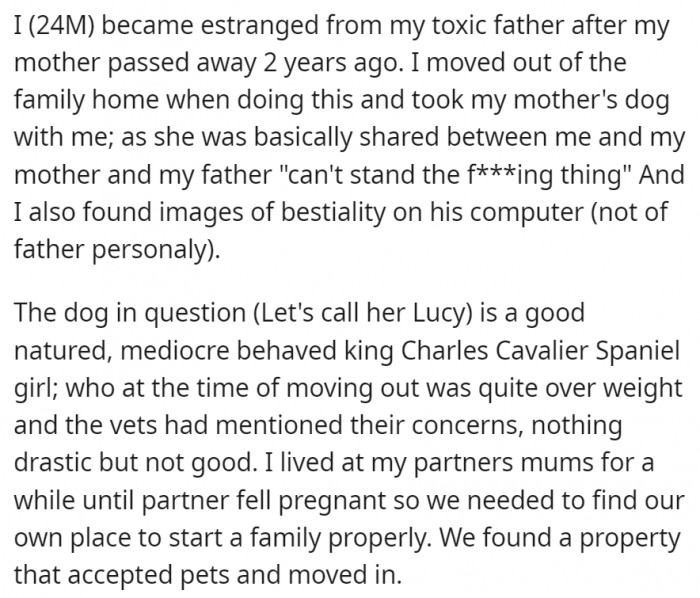
At first, they had to deal with the pup's overweight issue
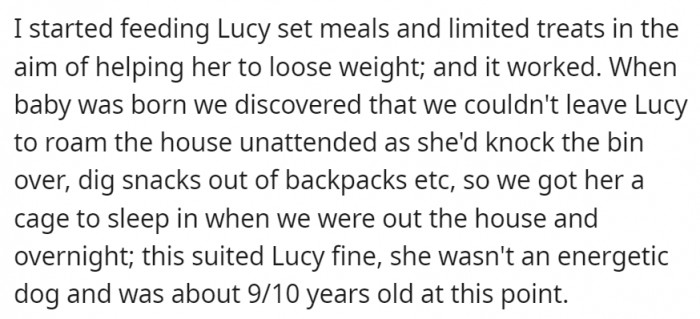
Grief and the Loss of a Pet
Dr. Jennifer Lee, a clinical psychologist specializing in grief, notes that losing a pet can be as traumatic as losing a human loved one.
Her research shows that the bond between pets and their owners can evoke deep emotional responses, including guilt and sadness, when circumstances force a separation.
Understanding these feelings is essential in navigating the grief process effectively.
The Emotional Weight of Giving Up a Pet
When faced with the decision to give up a pet, individuals often experience profound emotional distress. Research published in the American Journal of Psychiatry highlights that relinquishing a pet can trigger feelings of guilt, sadness, and loss, akin to those experienced in bereavement.
Understanding these emotional reactions is crucial for providing support to individuals in similar situations.
But when the couple started having kids, the dog's care took a backseat
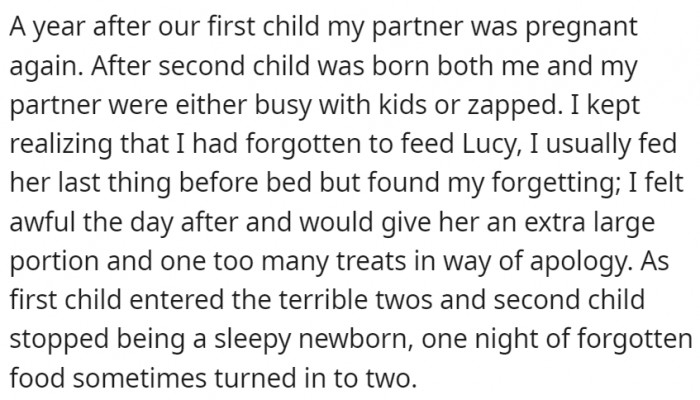
And OP found that he really couldn't care for Lucy properly anymore
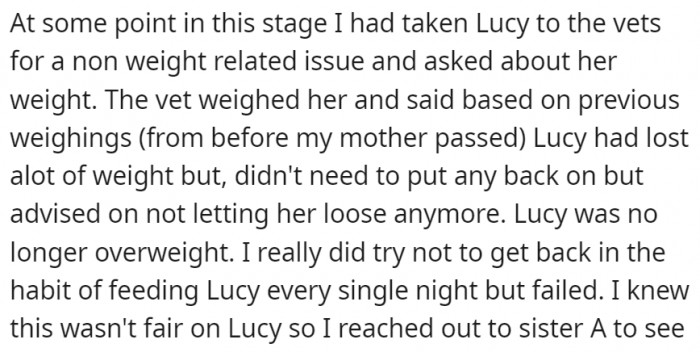
And when OP finally decided to do the right thing, his actions were turned against him by his father
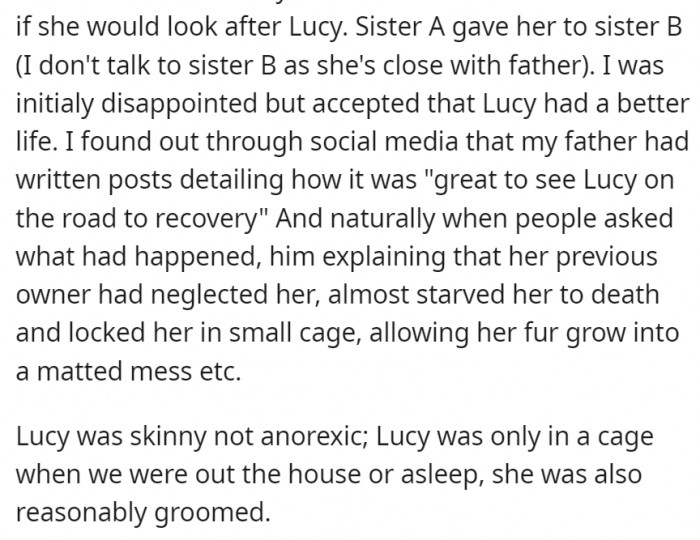
According to studies published in the Journal of Pet Loss and Grief, the emotional toll of giving up a pet can lead to significant psychological distress.
Many individuals report feelings of failure, particularly if they perceive that they could have done more to care for their animal.
This highlights the need for support systems for pet owners facing difficult decisions.
In the context of mental health, the decision to give up a pet can be particularly challenging for individuals dealing with depression or anxiety. A study from the University of Minnesota shows that the loss of a pet can exacerbate pre-existing mental health conditions, leading to increased vulnerability.
Developing a support network is essential during these times to help individuals process their emotions and find healthy coping mechanisms.
OP would have been the jerk here if he purposefully neglected Lucy, but the fact is, he didn't. Between juggling all the responsibilities they had as new parents, it can be difficult to care for a dog.
And OP did try his best to care for the dog despite their situation. There was simply too much going around.
Many people in the comments section sympathize with that. And many of them think that OP made the right choice.
However, a lot of people also said that OP did neglect the dog. Here are the top comments.
1. The biggest thing to consider on OP's side is that he did try and at least he admitted it that he couldn't care for her properly
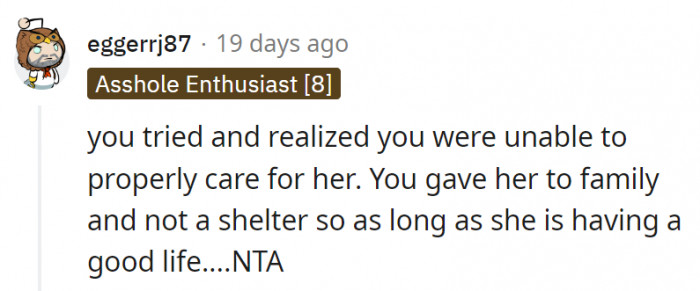
2. OP made the right call with Lucy and his dad is just trying to get a reaction and some drama going
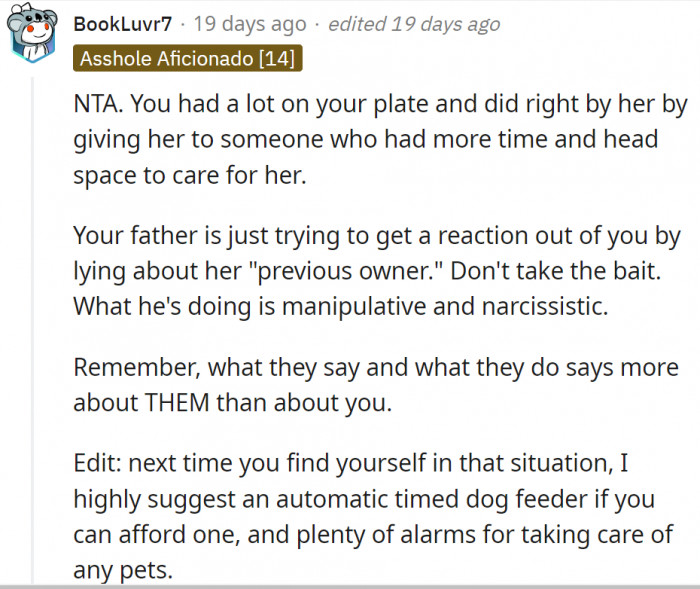
3. Sadly, OP didn't realize they had options before they gave Lucy up
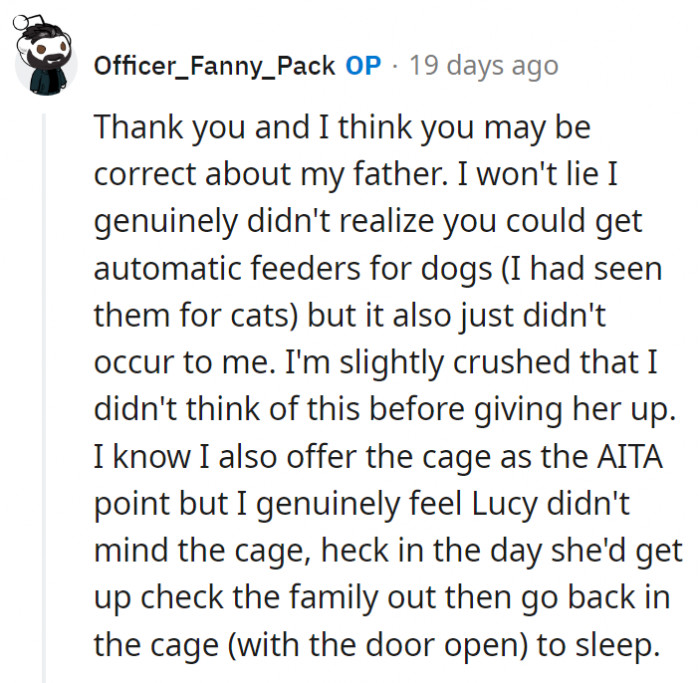
The Role of Support Systems
Research indicates that having a strong support system can alleviate the burden of grief associated with losing a pet.
Friends, family, and community members who understand the bond shared with pets can provide emotional support and validation, which is crucial during such a difficult time.
Encouraging open conversations about feelings of loss can also foster healing.
Coping Strategies for Pet Relinquishment
It’s important to recognize that relinquishing a pet doesn’t mean one is a failure as a caregiver. Mental health professionals suggest that acknowledging the difficult nature of such decisions can foster self-compassion and understanding.
Engaging in therapy or support groups can also provide a safe space for individuals to share their feelings and receive validation from others who have experienced similar losses.
4. Some people think that OP wasn't thinking of the dog enough
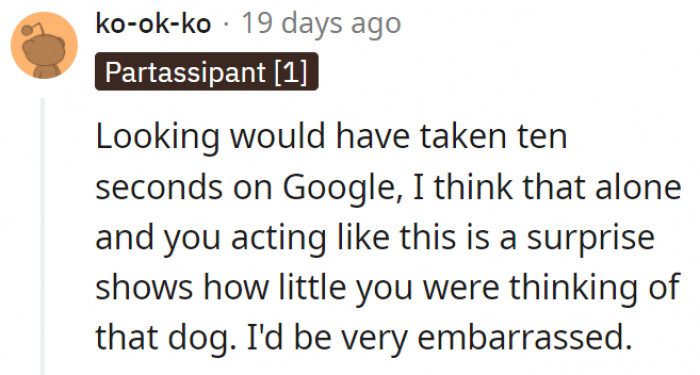
5. Others think that OP waited way too long before making the right call
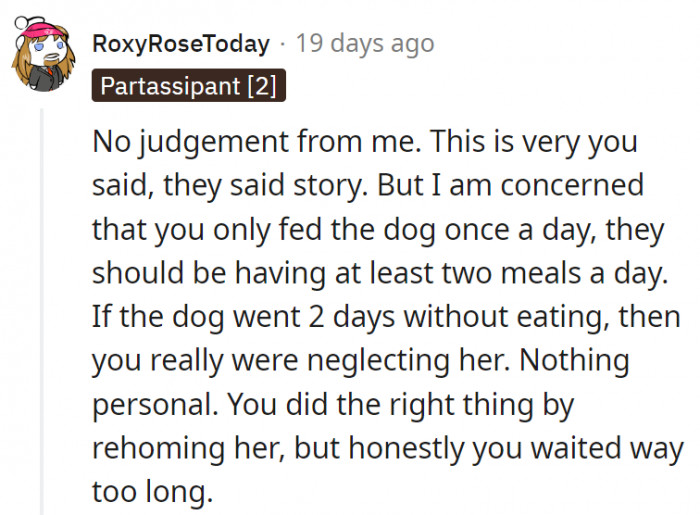
6. OP did good by taking care of the dog and making sure it was cared for in the end but it's hard to let go of those days of forgetting to feed her
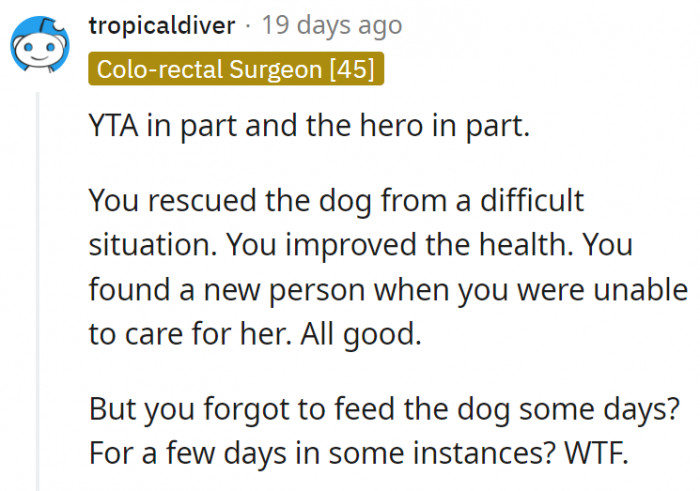
Pet loss support groups have emerged as a valuable resource for individuals dealing with this unique form of grief.
Studies show that sharing experiences with others who understand the bond with pets can help individuals process their emotions and reduce feelings of isolation.
These groups can provide comfort and practical advice on coping strategies during the grieving process.
Coping with the emotional fallout of giving up a pet requires a multifaceted approach. Practicing mindfulness and self-care can help individuals reconnect with their feelings and process their grief more effectively.
Additionally, exploring alternative solutions, such as finding a temporary foster home, might alleviate some of the feelings of loss.
7. Hopefully, the new family will be able to do what the previous family wasn't able to
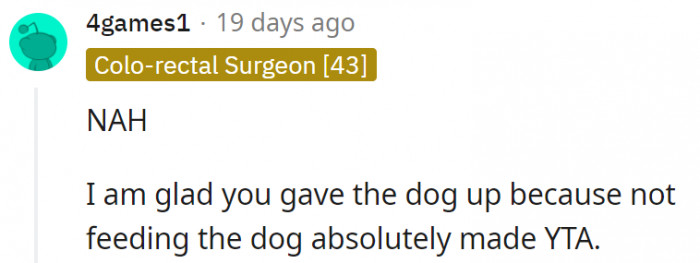
8. At least OP made an attempt to fix their mistake rather than keep it going
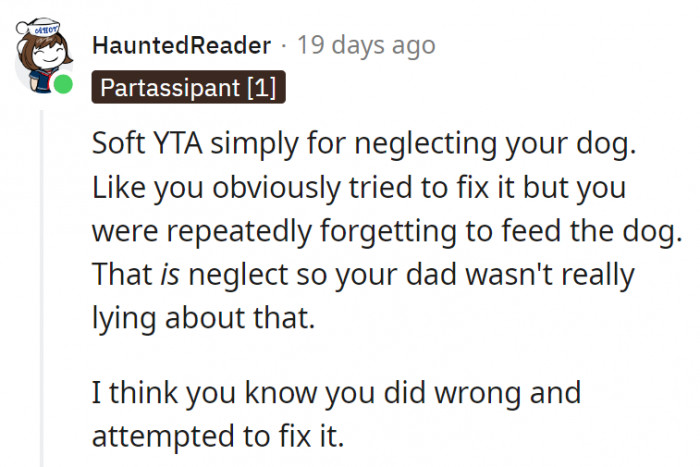
9. With kids, life can get crazy and it's perfectly okay to admit how that changes everything else and make amends for it
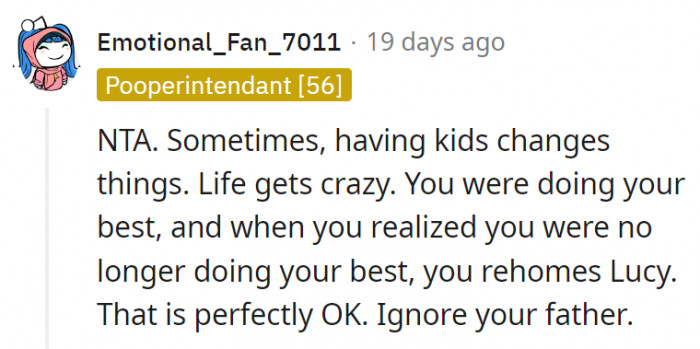
Navigating Guilt and Responsibility
Feelings of guilt often accompany the decision to give up a pet, particularly when owners believe they are failing in their responsibilities.
Clinical psychologists suggest that reframing these thoughts can be beneficial; recognizing that making a decision in the pet's best interest is a sign of love and responsibility.
This cognitive shift can help alleviate guilt and promote healing.
The Importance of Support Systems
A strong support system plays a critical role in navigating the challenges associated with pet relinquishment. Friends, family, and mental health professionals can provide crucial emotional support during this difficult time.
Research indicates that sharing one’s feelings and experiences with a trusted network can mitigate feelings of isolation and enhance emotional resilience.
10. OP may have waited too long to rehome Lucy but the good thing is that he did it in the end
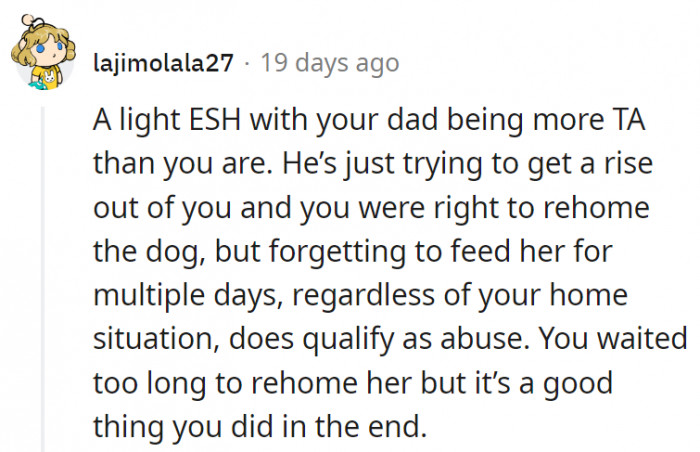
11. There will always be people looking out to step on whatever it is you do good or bad

12. It's better for the dog to go live with a family where she was a priority
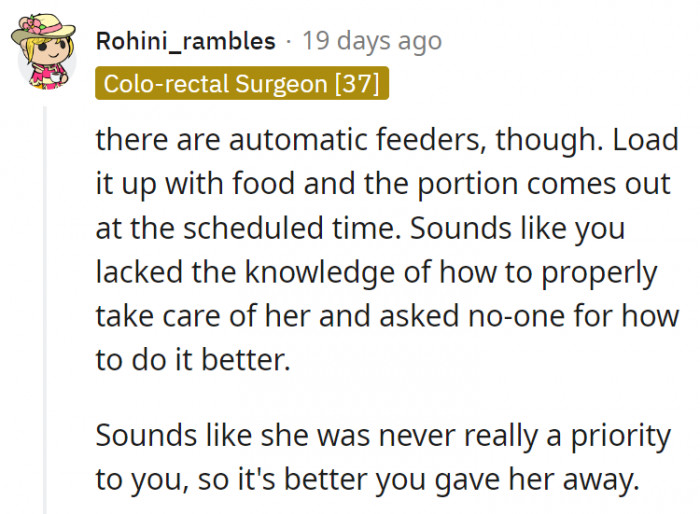
Involving a mental health professional can also be beneficial in developing personalized coping strategies. Therapeutic approaches such as cognitive-behavioral therapy can equip individuals with tools to manage their emotions more effectively.
Ultimately, the goal is to foster a sense of agency and self-compassion, empowering individuals to navigate their unique circumstances with grace.
The fact is OP did try his best. And while it may be sad that the dog didn't seem like a priority or that OP hadn't thought of better ways to make sure the dog was taken care of in their home, at least he tried to make amends for his mistakes in the end.
Now, the only thing that matters is that the pup is in a home where she'll hopefully be better cared for. What's your take on the issue?
Let us know!
Understanding Grief in the Context of Pet Loss
The grief experienced from giving up a pet is a significant emotional event that warrants recognition and compassion. Research in psychology emphasizes that pet loss can be a profound source of grief, often overlooked by society.
As noted by grief specialists, allowing oneself to grieve is a healthy part of processing loss, leading to eventual acceptance and healing.
Psychological Analysis
This situation reflects the deep emotional connections we form with our pets, often leading to intense feelings of guilt and sadness when faced with difficult decisions. Recognizing that these feelings are valid and common can help individuals process their experiences more effectively.
Encouraging open dialogue about pet relinquishment can also promote healing and understanding, allowing individuals to feel supported in their journey.
Analysis generated by AI
Analysis & Alternative Approaches
Relinquishing a pet is a complex emotional experience that can trigger various psychological responses. Studies consistently show the importance of acknowledging these feelings and providing appropriate support during such transitions.
By fostering understanding and empathy, we can help individuals navigate their grief and ultimately find peace in their decisions.
Analysis & Alternative Approaches
In conclusion, the emotional journey of giving up a pet can evoke a complex array of feelings, including grief, guilt, and sadness.
By understanding the psychological aspects of this experience, individuals can find healthier ways to cope and seek support during such a difficult transition.



